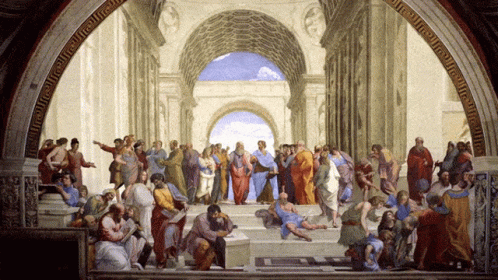Plato's Perspective on Death: The Immortal Soul and the Afterlife"
The fear of death is a misunderstanding of life. Plato's views on death and grief so you can live more purposefully.

Exploring the eternal nature of the soul and the mysteries of the afterlife through the lens of one of history's greatest minds.
Who was Plato?
The teacher of the teachers
Plato (428/427 BC – 348/347 BC) was a Greek philosopher, student of Socrates, and teacher of Aristotle. He founded the Academy in Athens, one of the first institutions of higher learning in the Western world. His writing has impacted how the western World thinks about philosophy, science, politics and mathematics.
Plato on Death
What were Plato's views on death?
"The really important thing is not life, but the good life, and the good life is only possible for the man who does not fear death." - Plato, (Symposium)
In his dialogue "Phaedo," Plato presents the argument that the soul is immortal and that death is simply a transition from one form of existence to another. He also discusses the idea of the "Forms," which are eternal, abstract concepts that represent the perfect, unchanging essence of things. Plato suggests that the soul is able to access the Forms after death and that this is what allows it to continue on in the afterlife.
What were Plato's views on the Afterlife?
Plato believed in the existence of an afterlife and he believed that the soul is immortal and eternal. According to Plato, the soul is separate from the body, and it is the source of an individual's consciousness and identity. When the body dies, the soul is released from its physical constraints and is able to continue on in the afterlife.
"Death is not the worst that can happen to men." - Plato (Apology)

What were Plato's Views on the Soul?
"Death is the release of the soul from the body, and the separation of the soul from the body is the separation of the two elements of which the soul is compounded - the rational and the irrational." - Plato, (Phaedo)
Plato believed that the soul is immortal and eternal and that it is the source of an individual's consciousness and identity. According to Plato, the soul is separate from the body, and it is the source of an individual's consciousness and identity. When the body dies, the soul is released from its physical constraints and is able to continue on in the afterlife.
Plato's concept of the Forms
"The true philosopher, inasmuch as he is a philosopher, will be willing to die at any time." Plato, (Theaetetus)
Plato believed that the soul is immortal because it is made up of the "Forms," which are eternal, abstract concepts that represent the perfect, unchanging essence of things. He argued that the soul is able to access the Forms after death and that this is what allows it to continue on in an afterlife.
Plato's philosophy of Grief and loss in
"Mourn not for the dead, but for those who die without having lived."
- Plato, (Symposium)
You don't have to continue grieving, as opposed to the contrary belief it is a choice. The idea of understanding grief and the change of forms can lead to Wisdom and some powerful insights that can change your life. Accepting death as a natural part will allow individuals to empower themselves to live more purposefully and with intent. This acceptance can change the trajectory of how you live and deal with grief.
Use this time to transform your perspective on death and live a life worth living. In the pursuit of a cause and on a mission that gives you meaning.
How to Address the Fear of Death from
"The fear of death is the pretence that one is wise when one is not, since it is the natural fear of all men that they do not know the nature of death, but suppose that it is the greatest evil." Plato (Phaedo)
Plato's views are that is foolish to be fearful of the unknown and what is not. It's the highest form of ignorance of ignoring the facts of what's in front of you. You can't have fear of the unknown you can only have fear from past experiences you deemed as negative or one-sided. Energy does not die, it changes shape and form. To be attached to that form is the cause of suffering.
The concept of justice in Plato's philosophy
- The idea that injustice causes suffering and grief
- The belief that justice ultimately leads to happiness and fulfillment
"He who commits injustice is ever made more wretched than he who suffers it." (Plato, "Gorgias," translated by Benjamin Jowett)
Summary of Plato on Grief, Death and the Soul
"The man who is afraid of death has not yet truly become a philosopher."
-Plato, (Symposium)
Plato's philosophy on death, grief, loss, and suffering is enduring and still relevant thousands of years later. Understanding, his concepts will impact how you will live and function in the world around us. Plato's legacy carries on because his wisdom and insights are still relevant and transformative to this day. We share it with you for the reason to take action towards one of the most transformative journeys in your life, something that doesn't have to be scary but liberating.
It is a heavyweight penalty to bear if you're holding the views of individuals perpetuating a story of grief, trauma and misfortune when the entire journey in Plato's view was about recollection. Recalling all the split parts of yourself and others to see the unconditional full state of consciousness. Which is that nothing is missing, just changing shape and changing form.
Join Us & Dissolve Grief & Loss
A transformative timeless approach to dissolving grief in hours, not weeks, months, years or decades.








Comments ()